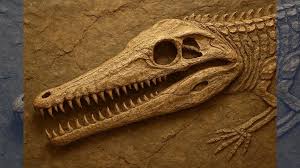"Fossil Find in Rajasthan Rewrites History Evidence of Ancient Marine Life Unearthed"
1. Introduction A Glimpse into Prehistoric Oceans
In a groundbreaking discovery, scientists have unearthed fossils in Rajasthan's Jaisalmer district that suggest the region was once submerged under a vast ocean. These findings challenge previous perceptions of the area's geological history and offer a rare glimpse into the marine life that thrived millions of years ago.
2. The Discovery Site Bandah Village
The fossils were discovered in Bandah village, located approximately 80 kilometers from Jaisalmer. The site, part of the Jaisalmer Basin, has long been a focal point for paleontological research due to its rich sedimentary deposits. The recent excavation has yielded a wealth of marine fossils, providing unprecedented insights into the region's ancient ecosystems.
3. The Fossils Unearthed
Among the most significant finds are the remains of primitive whales, shark teeth, crocodilian teeth, and turtle bones, all dating back to the Middle Eocene period, approximately 47 million years ago. These fossils indicate that the area, now characterized by arid deserts, was once a thriving marine environment teeming with diverse life forms.
4. Implications for Geological History
The presence of these marine fossils in a desert region suggests a dramatic shift in the Earth's climate and geography over millions of years. Experts believe that during the Middle Eocene, the region was part of a shallow sea, which gradually receded due to tectonic activities and climatic changes, leading to the formation of the current desert landscape.
5. Comparative Analysis with Other Regions
The faunal record from Bandah village shows striking similarities with previously reported marine fossils from the Middle Eocene Harudi formation in Gujarat and the Kachchh Basin. This comparison supports the theory of a widespread shallow marine environment covering large parts of the Indian subcontinent during that era.
6. The Role of the Geological Survey of India
The excavation was conducted by the Western Region of the Geological Survey of India (GSI), with senior geologists Krishna Kumar and Pragya Pandey leading the research under the supervision of Debasish Bhattacharya, Director of the Palaeontology Division. Their meticulous work has significantly contributed to our understanding of India's prehistoric marine ecosystems.
7. Broader Implications for Paleontology
This discovery not only enriches our knowledge of India's paleontological heritage but also underscores the dynamic nature of Earth's geological history. The findings highlight the importance of continued research and exploration in uncovering the hidden stories of our planet's past.
8. Conclusion A Window into Earth's Prehistoric Past
The fossil discoveries in Rajasthan's Jaisalmer district serve as a testament to the rich and varied history of our planet. They offer a unique opportunity to study ancient marine life and the environmental conditions that existed millions of years ago, providing valuable insights into the Earth's ever changing landscapes.
Science











